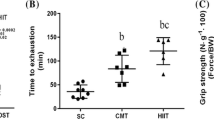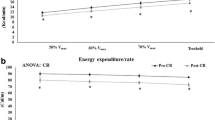Abstract.
The role of creatine supplementation in altering the physiological parameters regulating cardiac muscle's functional capacity through the initiation of cardiac hypertrophy and altered contractile protein expression has not been determined. The purpose of this study was to determine the effect of creatine supplementation, with and without exercise stress, on physiological parameters regulating functional capacity through alterations in rat cardiac mass and contractile-protein expression. Thirty male Sprague-Dawley rats were subjected to 30 min of exercise stress 5 days/week for 3 weeks with 2% of total body mass attached to the tail. Animals were randomly assigned to one of four treatment groups: group 1 (Con) received (1 ml/day) sucrose water by intubation tube (n=8); group 2 (Cr) received (1 ml/day) sucrose/creatine solution (n=6); group 3 (EX) received 1 ml/day sucrose water and the exercise stimulus (n=8), and group 4 (Cr/EX) received (1 ml/day) sucrose/creatine solution and the exercise stimulus (n=8). At the conclusion of the 21-day exercise-training period, the heart was collected and weighed for determination of wet weight, total protein, total RNA, and myosin heavy chain protein expression. RNA concentration decreased significantly (13%) in the EX group, but not in the CR/EX group, indicating an interactive effect of creatine and exercise. Total RNA significantly decreased (15%) in the EX group. Protein concentration significantly increased (9%) in the exercising treatments, while total protein did not change. Cardiac myosin heavy chain expression significantly shifted towards a predominant expression of the β-isoform in the Cr/EX group [54.53% (3.42) β]. These results indicate an interaction of creatine supplementation and swimming exercise stress that potentially alters cardiac protein synthesis and demonstrates a possible mechanism through which the combination of creatine supplementation and swimming stress stimuli act to alter the physiological parameters regulating cardiac functional capacity.
Similar content being viewed by others
Author information
Authors and Affiliations
Additional information
Electronic Publication
Rights and permissions
About this article
Cite this article
McClung, .J., Hand, .G., Davis, .J. et al. Effect of creatine supplementation on cardiac muscle of exercise-stressed rats. Eur J Appl Physiol 89, 26–33 (2003). https://doi.org/10.1007/s00421-002-0746-6
Accepted:
Issue Date:
DOI: https://doi.org/10.1007/s00421-002-0746-6




